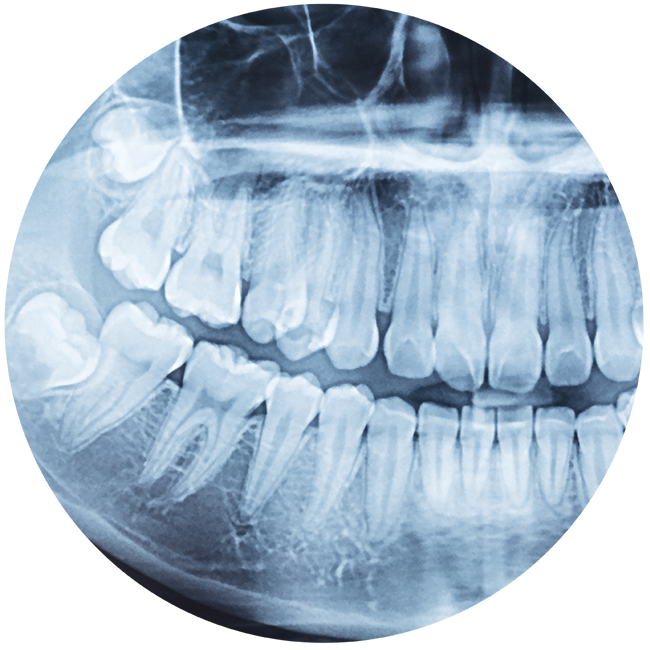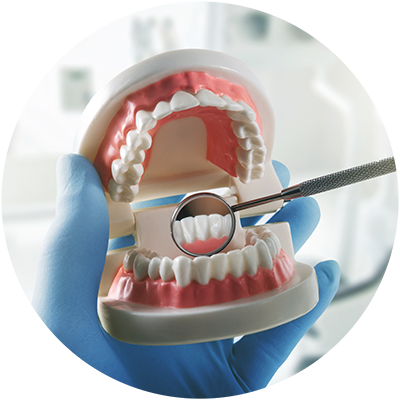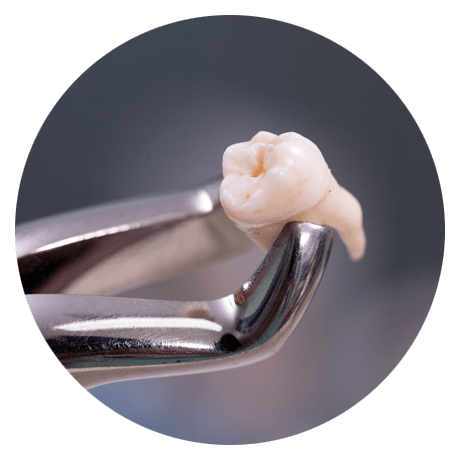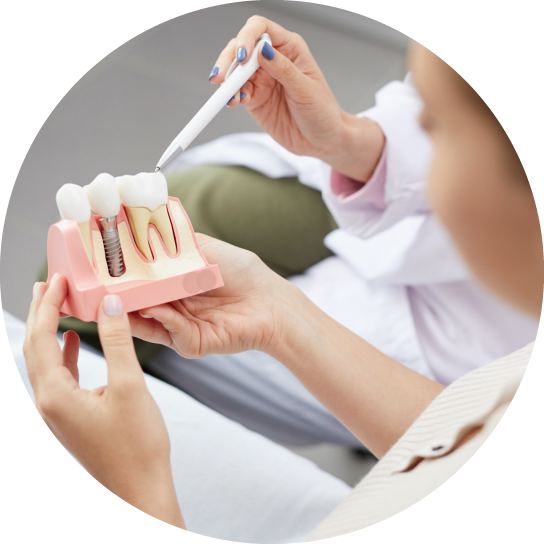Tooth Extraction in Edmonton, Alberta
Dental extraction, or “exodontia,” becomes necessary when the structural damage on a tooth is beyond repair. It gently removes or pulls the tooth from its socket.
At Ellerslie 66 Dental Clinic, we prioritize your oral health and recommend extraction only when all other viable options have been exhausted.
Before suggesting tooth extraction or the removal of a tooth, our experienced dentists conduct a thorough medical evaluation of your condition. This includes a comprehensive visual examination of the affected tooth and a review of your dental X-rays to gather information. Additionally, we consider your complete dental and medical history to ensure the best course of action for your oral health and care.
Tooth extraction procedures are typically recommended for the following conditions:
- Impacted wisdom teeth
- Cracked or severely damaged teeth
- Severe tooth decay or infection
- Supernumerary or poorly formed teeth
- Preparation for orthodontic treatment
- Preventative measures on teeth that might become impacted or cause problems in the future

Wisdom Teeth Extractions: Alleviating Pain and Complications
Impacted wisdom teeth can pose medical problems for many patients, leading to pain and distress. While temporary solutions like antibiotics and mouthwash may provide relief, the ultimate resolution often requires the extraction of wisdom teeth.
At Ellerslie 66 Dental, we prioritize your comfort and oral health. We offer comprehensive evaluations of your wisdom teeth based on reliable information from visual examination, interviews, and diagnostic tests such as panoramic X-rays. Depending on the severity of the condition, we may refer you to an oral surgeon for extraction.
Wisdom teeth, or third molars, commonly appear between the ages of 17 and 25, resembling the eruption of other permanent teeth. Most individuals have four wisdom teeth – upper and lower, left and right – although variations exist where some may have fewer or none.
The challenge arises when wisdom teeth become impacted or infected, growing at irregular angles against adjacent molars. In such cases, tooth extraction is necessary to alleviate pain and prevent further complications.
Ellerslie 66 Dental specializes in dental extraction services in Edmonton, providing personalized assessments and tailored solutions for patients with impacted wisdom teeth or concerns about future impaction
What Happens During the Tooth Extraction Procedure?
The tooth extraction procedure is a straightforward process that your dental professional can typically perform quickly and with minimal complications. Tooth extraction is the total extraction of a tooth from its jaw bone socket.
In most cases, patients remain conscious throughout the procedure, with local anesthetic applied to numb any pain and reduce anxiety.
For simple tooth extractions:
-
- Your dentist will use a specialized tool to gently rock the tooth back and forth, loosening it from the surrounding gum and bone tissue.
- Your dentist may need to make a small incision in the gums to access and remove the impacted tooth.
- Once your tooth is pulled, the tooth socket is disinfected.
- In some patients, a dental bone graft is added to the socket to prevent bone loss in the jaw.
- Your dentist may also stitch the excised gum tissue to help in its healing process.
While you may feel some pressure during the extraction, the local anesthetic ensures that any pain is effectively managed.

How Painful is Tooth Extraction?
Tooth extraction is not painful due to the options of sedation dentistry. While local anesthesia is typically administered before the procedure, your dentist can also recommend sedation options for people who want to be more comfortable during the extraction
The options include nitrous oxide or gauging gas, oral sedatives, and IV sedation administered by a certified healthcare professional. These sedatives allow you to be conscious but relaxed. General anesthesia is recommended for people who need to be unconscious during the procedure.
What should I do after my tooth extraction?
After your tooth extraction, it is crucial to adhere to your dentist’s instructions to promote proper healing and prevent infection. By following these simple guidelines, you can enable recovery to full health and minimize the risk of complications.
After the Procedure
Immediately after tooth extraction, your dentist will instruct you to bite on a gauze pad to promote blood clot formation in the tooth socket. You should keep the gauze in place until the bleeding or oozing stops. While clotting typically occurs within 2 hours, it may take longer in some cases. If bleeding persists, apply gentle pressure with clean gauze until it subsides.
If you experience tenderness, pain, or swelling after the procedure, apply an ice pack to the affected area as directed by your dentist. You may also take pain medication as prescribed, but avoid aspirin, as it can interfere with blood clot formation. You may experience swelling and tenderness inside your mouth where the extraction site is, which will subside within 48 hours.
First 24 Hours Aftercare
In the aftercare, ensure adequate hydration and follow a soft diet for the first 24 hours following extraction. Gradually reintroduce everyday foods as tolerated for proper healing.
Finally, resume your regular oral hygiene routine after 24 hours. Gentle brushing, flossing, and light rinsing promote oral health and prevent gum disease.
Prevent Dry Sockets
If a clot doesn’t form, a dry socket condition occurs. Dry sockets expose the bone and nerves, causing pain and slower healing. To reduce the risk of dry sockets, you can prevent dislodging the blood clot by avoiding the following in the first 24 hours after surgery:
-
- Brushing near the extraction site
- Vigorous rinsing
- Drinking alcohol or using alcohol-based mouthwash
For the 72 hours after surgery, avoid doing the following:
-
- Suction activities inside your mouth, such as using a straw or smoking
- Strenuous physical activities, such as excessive exercise or aerobics, could elevate your blood pressure.
When to Contact Your Dentist
Contact your dentist if you develop signs of infections such as fever, pus, or severe pain not alleviated by medication. Make sure to attend follow-up appointments so your dentist can monitor your recovery.

How Long Would Tooth Extraction Recovery Be?
The time of full recovery will take about 1-4 months, depending on the patient’s case.
After a tooth extraction, the bleeding will stop after 24 hours. By the next 24 hours, the blood clot would be fully formed in the tooth hole.
You’ll be well enough to return to work or school in three days. During the next three weeks after the surgery, the tooth hole in the gum area will have filled up through cell repair and regeneration.
Then, in a month or four, the tooth hole in the gum area will no longer have an indentation. At that time, the tooth socket in your jawbone will be filled with new bone tissue.
Should I Replace My Teeth After an Extraction?
Teeth extraction doesn’t always necessitate replacement, particularly in the case of impacted wisdom teeth removal.
However, following a tooth extraction, you can replace your tooth or teeth with various solutions such as a bridge, dental implant, or dentures. At Ellerslie 66 Dental, your dentist will provide personalized dental care to help you decide whether tooth replacement is necessary for aesthetic or oral health reasons.
Replacing extracted teeth can not only restore your smile but also maintain proper oral function and prevent medical complications such as shifting of adjacent teeth or bone loss.

Enhancing Your Oral Health with Ellerslie 66 Dental
At Ellerslie 66 Dental in Edmonton, we are committed to providing comprehensive medical care tailored to your needs. If you require a routine tooth extraction or wisdom tooth removal, we ensure your path to dental health is comfortable, safe, and streamlined. Schedule an appointment today to experience the difference at Ellerslie 66 Dental.

